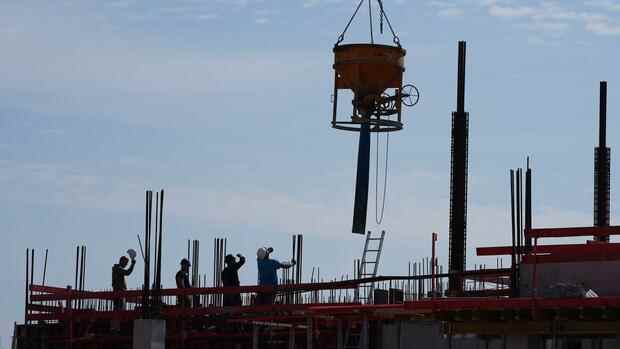Building material prices had already exploded last year. According to data from the Federal Statistical Office, the prices for individual building materials such as wood and steel rose on average in 2021 more than at any time since the survey began in 1949.
(Photo: dpa)
Berlin The North Rhine-Westphalian Minister of Construction Ina Scharrenbach (CDU) has asked the Cartel Office to focus on price developments in the construction sector. “We are currently experiencing a massive price increase in the construction sector, for example for individual construction products such as insulation materials and structural steel,” Scharrenbach told the Handelsblatt. “It would be good if the cartel office took a look at the whole thing. I have the impression that there are attempts at free-rider effects in one place or another, but also price fixing.”
Most recently, Federal Economics Minister Robert Habeck (Greens) asked the Federal Cartel Office to monitor prices very closely and to take action if there were any indication of abusive behavior with regard to petrol and diesel.
The rising prices for building materials are now becoming a problem for Federal Building Minister Klara Geywitz (SPD). It must implement the central project of the federal government to create 400,000 new apartments per year. But that is becoming increasingly difficult.
According to data from the Federal Statistical Office, the prices for individual building materials such as wood and steel rose last year: on average for 2021, more strongly than at any time since the survey began in 1949. Reinforcing steel products cost almost 53 percent more than in the previous year.
Top jobs of the day
Find the best jobs now and
be notified by email.
Steel will continue to become more expensive in 2022. The Hessian building contractor Thomas Reimann, head of Alea Hoch- und Industriebau AG, reports: “A ton of steel cost 950 euros in December, now we are at 1800 euros.” Particularly problematic: “We only get daily prices. There is sufficient quantity, but the price is being played with.”
Federal Cartel Office is responsible
In the case of insulating materials, the delivery capacities are also severely restricted. “The lead time here is four, sometimes five months – and there were three price increases in 2022 alone. Since January, prices have risen by a further almost 30 percent.”
Existing orders are still being processed, but many new ones are being put on hold, Reimann explained: “The enormous price increases are fueling uncertainty among companies and fear among end consumers, who are also struggling with higher interest rates.” For him, one thing is certain: From the 400,000 new apartments per year will be nothing in the coming years. “From 2023 the maximum will be 250,000 new apartments.”
Other federal states have so far been cautious. The Baden-Württemberg Ministry of Economic Affairs states that there are many reasons for the price increases observed for a large number of raw materials and products. The delivery capacities of the manufacturers are limited anyway, which is being exacerbated by the Ukraine war. In addition, there is a lack of transport capacity and interrupted supply chains, for example due to port closures, a shortage of containers or the congestion of cargo ships. Energy costs also had a major impact here.
“However, we have no indications of anti-competitive agreements and we have not received any information from other parties to date,” the ministry said. The Hessian Ministry of Economics also announced: “There are no indications of price agreements.”
>>> Also read here: Cartel Office can Take a closer look at Facebook thanks to new rules
The Bavarian Ministry of Construction referred to the Federal Cartel Office, which “monitors the price developments for the affected products within the scope of its responsibility”. In fact, the Federal Cartel Office is responsible for all sectors. However, no current statement was available.
The building materials industry is vulnerable to cartels
The Bonn antitrust lawyer and former head of the Monopolies Commission Daniel Zimmer says: “In fact, the building materials industry is considered to be susceptible to cartels, as numerous official proceedings from the past 50 years against cement manufacturers, for example, show.”
In the uncertain economic situation shaped by the Ukraine war, however, the causes of price increases are often difficult to assess. It remains to be investigated whether there are actually more price agreements between suppliers of building materials than at other times, as some people have assumed.
Ina Scharrenbach (CDU) is State Minister for Home, Municipal Affairs, Building and Equal Opportunities.
(Photo: dpa)
However, even if a manufacturer were to raise its prices today in anticipation of an imminent increase in input costs, this would be legitimate from a legal point of view. Zimmer explains: “It only becomes illegal when the producers or dealers discuss or coordinate such price increases with their competitors. It cannot be ruled out that this will happen and would have to be proven by the antitrust authorities.”
It is precisely this focus of the Cartel Office that NRW Building Minister Scharrenbach called for: “It must not be the case that manufacturers take advantage of the general situation of rising prices for extra surcharges,” she said. “Everyone suffers from this. Ultimately, the increased construction costs will also be felt by the tenants and the owners. That must not be.”
More: Subsidy chaos, raw material crisis, high prices: Germany’s housing problem is coming to a head

